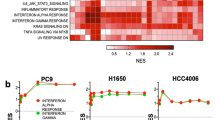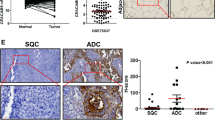Abstract
The emergence of epidermal growth factor receptor tyrosine kinase inhibitors (EGFR-TKIs) has improved the prognosis for lung cancer patients with EGFR-driven mutations. However, acquired resistance to EGFR-TKIs poses a significant challenge to the treatment. Overcoming the resistance has primarily focused on developing next-generation targeted therapies based on the molecular mechanisms of resistance or inhibiting the activation of bypass pathways to suppress or reverse the resistance. In this study we developed a novel approach by using CRISPR-Cas9 whole-genome library screening to identify the genes that enhance the sensitivity of lung adenocarcinoma cells to EGFR-TKIs. Through this screening, we revealed integrin subunit alpha 8 (ITGA8) as the key gene that enhanced sensitivity to abivertinib in lung adenocarcinoma. Notably, ITGA8 expression was significantly downregulated in lung adenocarcinoma tissues compared to adjacent normal tissues. Bioinformatics analyses revealed that ITGA8 was positively correlated with the sensitivity of lung adenocarcinoma to abivertinib. We showed that knockdown of ITGA8 significantly enhanced the proliferation, migration and invasion of H1975 cells. Conversely, overexpression of ITGA8 reduced the proliferation migration and invasion of H1975/ABIR cells. Furthermore, we demonstrated that ITGA8 sensitized lung adenocarcinoma cells to EGFR-TKIs by attenuating the downstream FAK/SRC/AKT/MAPK signaling pathway. In H1975 cell xenograft mouse models, knockdown of ITGA8 significantly increased tumor growth and reduced the sensitivity to abivertinib, whereas overexpression of ITGA8 markedly suppressed tumor proliferation and enhanced sensitivity to the drug. This study demonstrates that ITGA8 inhibits the proliferation, invasion and migration of lung adenocarcinoma cells, enhances the sensitivity to EGFR-TKIs, improves treatment efficacy, and delays the progression of acquired resistance. Thus, ITGA8 presents a potential therapeutic candidate for addressing acquired resistance to EGFR-TKIs from a novel perspective.
This is a preview of subscription content, access via your institution
Access options
Subscribe to this journal
Receive 12 print issues and online access
$259.00 per year
only $21.58 per issue
Buy this article
- Purchase on SpringerLink
- Instant access to full article PDF
Prices may be subject to local taxes which are calculated during checkout








Similar content being viewed by others
References
Sung H, Ferlay J, Siegel RL, Laversanne M, Soerjomataram I, Jemal A, et al. Global Cancer Statistics 2020: GLOBOCAN estimates of incidence and mortality worldwide for 36 cancers in 185 countries. CA Cancer J Clin. 2021;71:209–49.
Yang P, Allen MS, Aubry MC, Wampfler JA, Marks RS, Edell ES, et al. Clinical features of 5628 primary lung cancer patients experience at Mayo Clinic from 1997 to 2003. Chest. 2005;128:452–62.
Herbst RS, Morgensztern D, Boshoff C. The biology and management of non-small cell lung cancer. Nature. 2018;553:446–54.
Saber A, van der Wekken A, Hiltermann TJN, Kok K, van den Berg A, Groen HJM. Genomic aberrations guiding treatment of non-small cell lung cancer patients. Cancer Treat Commun. 2015;4:23–33.
Shi Y, Au JS, Thongprasert S, Srinivasan S, Tsai CM, Khoa MT, et al. A prospective, molecular epidemiology study of EGFR mutations in Asian patients with advanced non-small-cell lung cancer of adenocarcinoma histology (PIONEER). J Thorac Oncol. 2014;9:154–62.
Sharma SV, Bell DW, Settleman J, Haber DA. Epidermal growth factor receptor mutations in lung cancer. Nat Rev Cancer. 2007;7:169–81.
Wang C, Wang T, Lv D, Li L, Yue J, Chen HZ, et al. Acquired resistance to EGFR TKIs mediated by TGFbeta1/Integrin beta3 signaling in EGFR-mutant lung cancer. Mol Cancer Ther. 2019;18:2357–67.
Wu SG, Shih JY. Management of acquired resistance to EGFR TKI-targeted therapy in advanced non-small cell lung cancer. Mol Cancer. 2018;17:38.
Yu HA, Arcila ME, Rekhtman N, Sima CS, Zakowski MF, Pao W, et al. Analysis of tumor specimens at the time of acquired resistance to EGFR-TKI therapy in 155 patients with EGFR-mutant lung cancers. Clin Cancer Res. 2013;19:2240–7.
Rotow J, Bivona TG. Understanding and targeting resistance mechanisms in NSCLC. Nat Rev Cancer. 2017;17:637–58.
Chhouri H, Alexandre D, Grumolato L. Mechanisms of acquired resistance and tolerance to EGFR targeted therapy in non-small cell lung cancer. Cancers. 2023;15:504.
Yan D, Huelse JM, Kireev D, Tan Z, Chen L, Goyal S, et al. MERTK activation drives osimertinib resistance in EGFR-mutant non–small cell lung cancer. J Clin Invest. 2022;132:e150517.
Minari R, Bordi P, Tiseo M. Third-generation epidermal growth factor receptor-tyrosine kinase inhibitors in T790M-positive non-small cell lung cancer: review on emerged mechanisms of resistance. Transl Lung Cancer Res. 2016;5:695–08.
Schoenfeld AJ, Chan JM, Kubota D, Sato H, Rizvi H, Daneshbod Y, et al. Tumor analyses reveal squamous transformation and off-target alterations as early resistance mechanisms to first-line osimertinib in EGFR-mutant lung cancer. Clin Cancer Res. 2020;26:2654–63.
Wang B, Wang M, Zhang W, Xiao T, Chen C-H, Wu A, et al. Integrative analysis of pooled CRISPR genetic screens using MAGeCKFlute. Nat Protoc. 2019;14:756–80.
Gonzalez AM, Bhattacharya R, deHart GW, Jones JC. Transdominant regulation of integrin function: mechanisms of crosstalk. Cell Signal. 2010;22:578–83.
Samarzija I, Dekanic A, Humphries JD, Paradzik M, Stojanovic N, Humphries MJ, et al. Integrin crosstalk contributes to the complexity of signalling and unpredictable cancer cell fates. Cancers. 2020;12:1910.
Cagnet S, Faraldo MM, Kreft M, Sonnenberg A, Raymond K, Glukhova MA. Signaling events mediated by alpha3beta1 integrin are essential for mammary tumorigenesis. Oncogene. 2014;33:4286–95.
Ramirez NE, Zhang Z, Madamanchi A, Boyd KL, O’Rear LD, Nashabi A, et al. The alpha(2)beta integrin is a metastasis suppressor in mouse models and human cancer. J Clin Invest. 2011;121:226–37.
Ramovs V, Te Molder L, Sonnenberg A. The opposing roles of laminin-binding integrins in cancer. Matrix Biol. 2017;57-58:213–43.
Hamidi H, Ivaska J. Every step of the way: integrins in cancer progression and metastasis. Nat Rev Cancer. 2018;18:533–48.
Wu J, Cheng J, Zhang F, Luo X, Zhang Z, Chen S. Estrogen receptor alpha is involved in the regulation of ITGA8 methylation in estrogen receptor-positive breast cancer. Ann Transl Med. 2020;8:993.
Ryu J, Koh Y, Park H, Kim DY, Kim DC, Byun JM, et al. Highly expressed integrin-alpha8 induces epithelial to mesenchymal transition-like features in multiple myeloma with early relapse. Mol Cells. 2016;39:898–908.
Lu X, Wan F, Zhang H, Shi G, Ye D. ITGA2B and ITGA8 are predictive of prognosis in clear cell renal cell carcinoma patients. Tumor Biol. 2016;37:253–62.
Kok-Sin T, Mokhtar NM, Ali Hassan NZ, Sagap I, Mohamed Rose I, Harun R, et al. Identification of diagnostic markers in colorectal cancer via integrative epigenomics and genomics data. Oncol Rep. 2015;34:22–32.
Alanko J, Ivaska J. Endosomes: emerging platforms for integrin-mediated FAK signalling. Trends Cell Biol. 2016;26:391–8.
Mitra SK, Schlaepfer DD. Integrin-regulated FAK–Src signaling in normal and cancer cells. Curr Opin Cell Biol. 2006;18:516–23.
Sood AK, Coffin JE, Schneider GB, Fletcher MS, DeYoung BR, Gruman LM, et al. Biological significance of focal adhesion kinase in ovarian cancer: role in migration and invasion. Am J Pathol. 2004;165:1087–95.
Avizienyte E, Frame MC. Src and FAK signalling controls adhesion fate and the epithelial-to-mesenchymal transition. Curr Opin Cell Biol. 2005;17:542–7.
Benlimame N, He Q, Jie S, Xiao D, Xu YJ, Loignon M, et al. FAK signaling is critical for ErbB-2/ErbB-3 receptor cooperation for oncogenic transformation and invasion. J Cell Biol. 2005;171:505–16.
Mitra SK, Lim ST, Chi A, Schlaepfer DD. Intrinsic focal adhesion kinase activity controls orthotopic breast carcinoma metastasis via the regulation of urokinase plasminogen activator expression in a syngeneic tumor model. Oncogene. 2006;25:4429–40.
Wu X, Gan B, Yoo Y, Guan JL. FAK-mediated src phosphorylation of endophilin A2 inhibits endocytosis of MT1-MMP and promotes ECM degradation. Dev Cell. 2005;9:185–96.
Hu B, Jarzynka MJ, Guo P, Imanishi Y, Schlaepfer DD, Cheng SY. Angiopoietin 2 induces glioma cell invasion by stimulating matrix metalloprotease 2 expression through the alphavbeta1 integrin and focal adhesion kinase signaling pathway. Cancer Res. 2006;66:775–83.
Hsia DA, Mitra SK, Hauck CR, Streblow DN, Nelson JA, Ilic D, et al. Differential regulation of cell motility and invasion by FAK. J Cell Biol. 2003;160:753–67.
Acknowledgements
This work was supported by the National Natural Science Foundation of China (grants 82172569, 82072595), the Natural Science Foundation of Tianjin (23JCZDJC00710, 23JCYBJC01010), the Tianjin Key Medical Discipline (Specialty) Construction Project (TJYXZDXK-061B), the Tianjin Health Science and Technology Project (TJWJ2022XK005), and Science Foundation of Tianjin Educational Commission Fund (2020KJ157, 2020KJ155).
Author information
Authors and Affiliations
Contributions
JC, HYL, and YWL contributed to the study conception and design. XGL, GSZ, and PJC conducted the data analysis. HH, YHC, and CC performed the data collection. PJC, DW, CD, ZHZ, RHZ, ZXH, WHZ, and MHL conducted material preparation. The first draft of the manuscript was written by XGL and all authors commented on previous versions of the manuscript. All authors read and approved the final manuscript.
Corresponding authors
Ethics declarations
Competing interests
The authors declare no competing interests.
Rights and permissions
Springer Nature or its licensor (e.g. a society or other partner) holds exclusive rights to this article under a publishing agreement with the author(s) or other rightsholder(s); author self-archiving of the accepted manuscript version of this article is solely governed by the terms of such publishing agreement and applicable law.
About this article
Cite this article
Li, Xg., Zhu, Gs., Cao, Pj. et al. Genome-wide CRISPR-Cas9 screening identifies ITGA8 responsible for abivertinib sensitivity in lung adenocarcinoma. Acta Pharmacol Sin 46, 1419–1432 (2025). https://doi.org/10.1038/s41401-024-01451-0
Received:
Accepted:
Published:
Issue date:
DOI: https://doi.org/10.1038/s41401-024-01451-0
Keywords
This article is cited by
-
CRISPR-Cas9 screening identifies a gene signature predictive of prognosis in glioblastoma
Scientific Reports (2025)
-
USP3 stabilizes MIC19 by deubiquitination under hypoxic stress and promotes the progression of non-small cell lung cancer
Acta Pharmacologica Sinica (2025)



